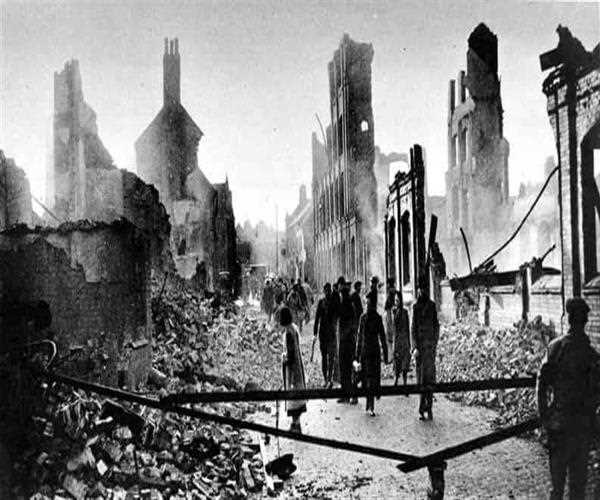*The Blitz*

The Blitz alludes to the vital shelling effort led by the Germans against London and different urban communities in England from September of 1940 through May of 1941, focusing on populated regions, manufacturing plants, and dockyards.
The principal German assault on London really happened unintentionally. The evening of August 24, 1940, Luftwaffe aircraft going for military focus on the edges of London floated off-kilter and rather dropped their bombs on the focal point of London devastating a few homes and executing regular folks. In the midst of people in general shock that took after, Prime Minister Winston Churchill, trusting it was a consider assault, requested Berlin to be besieged the following night.
Around 40 British aircraft figured out how to achieve Berlin and delivered insignificant property harm. In any case, the Germans were completely paralyzed by the British air-assault on Hitler's capital. It was the first run through bombs had ever fallen on Berlin. Exacerbating the situation, they had been over and again guaranteed by Luftwaffe Chief, Hermann Göring, that it would never happen. A moment British shelling attack the evening of August 28/29 brought about Germans slaughtered on the ground. Two evenings later, a third assault happened.
German nerves were frayed. The Nazis were offended. In a discourse conveyed on September 4, Hitler undermined, "...When the British Air Force drops a few or four thousand kilograms of bombs, at that point we will in one-night drop 150-, 230-, 300-or 400,000 kilograms. When they proclaim that they will expand their assaults on our urban areas, at that point we will level their urban areas to the ground. We will stop the handicraft of those night air privateers, by God!"
Starting on September 7, 1940, and for an aggregate of 57 back to back evenings, London was shelled. The choice to wage a monstrous bombarding effort against London and other English urban areas would turn out to be a standout amongst the most game-changing of the war. Up to that point, the Luftwaffe had focused on Royal Air Force runways and bolster establishments and had about annihilated the whole British air safeguard framework. Changing to a hard and fast assault on British urban communities gave RAF Fighter Command a frantically required break and the chance to remake harmed landing strips, prepare new pilots and repair airship. "It was," Churchill later expressed, "subsequently with a positive feeling that Fighter Command felt the German assault swing on to London..."
Amid the daily shelling attacks on London, individuals took protect in distribution center storm cellars and underground (metro) stations where they mulled over temporary beds in the midst of crude conditions with no security and poor sanitation offices.
Other British urban communities focused amid the Blitz included; Portsmouth, Southampton, Plymouth, Exeter, Bristol, Bath, Cardiff, Birmingham, Coventry, Nottingham, Norwich, Ipswich, Sheffield, Manchester, Liverpool, Hull, Middlesbrough, Sunderland, Newcastle and furthermore Glasgow, Scotland and Belfast, Northern Ireland.
Hitler's aim was to break the resolve of the British individuals with the goal that they would weight Churchill into arranging. Nonetheless, the besieging had the contrary impact, uniting the English individuals to confront a typical adversary. Supported by Churchill's incessant open appearances and radio discourses, the general population wound up resolved to hold out uncertainly against the Nazi assault. "The same old thing," could be seen wherever written in chalk on barricaded shop windows.
Before the finish of 1940, German air assaults had executed 15,000 British regular folks. One of the most noticeably awful assaults had happened the evening of November 14/15 against Coventry, a mechanical city east of Birmingham in focal England. In that strike, 449 German planes dropped 1,400 high dangerous bombs and 100,000 ignitables which obliterated 50,000 structures, executing 568 people, leaving more than 1,000 seriously harmed. The ignitable gadgets made firestorms with super-warmed intense breezes attracting deluges of air to fan tremendous dividers of flares.
In London, the evening of December 29/30, the Germans dropped ignitables bringing about a firestorm that crushed the zone between St. Paul's Cathedral and the Guildhall, decimating a few notable holy places. Different popular milestones harmed amid the Blitz included Buckingham Palace, Westminster Abbey, and the Chamber of the House of Commons. The Blitz peaked in May of 1941, leaving 375,000 Londoners destitute.
Be that as it may, the RAF, using recently created radar, dispensed progressively overwhelming misfortunes on Luftwaffe aircraft. English Fighter Command could track and plot the course of German planes from the minute they took off from bases in Europe. RAF military aircraft were then dispatched to assault the approaching planes at the most ideal position. Therefore, the Luftwaffe never picked up air matchless quality over England, an essential to a land intrusion. Inability to accomplish air matchless quality, in the long run, drove Hitler to inconclusively put off Operation Sealion, the Nazi intrusion of England, for an assault on the USSR. The Blitz reached an end as Hitler requested the Luftwaffe exchanged to eastern Europe in anticipation of Operation Barbarossa, the attack of the USSR.
On the whole, 18,000 tons of high explosives had been dropped on England amid eight months of the Blitz. A sum of 18,629 men, 16,201 ladies, and 5,028 youngsters was slaughtered alongside 695 unidentified singed bodies.
Cheers!